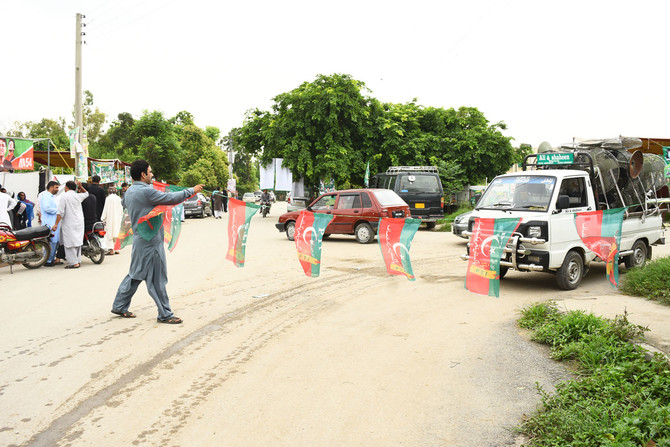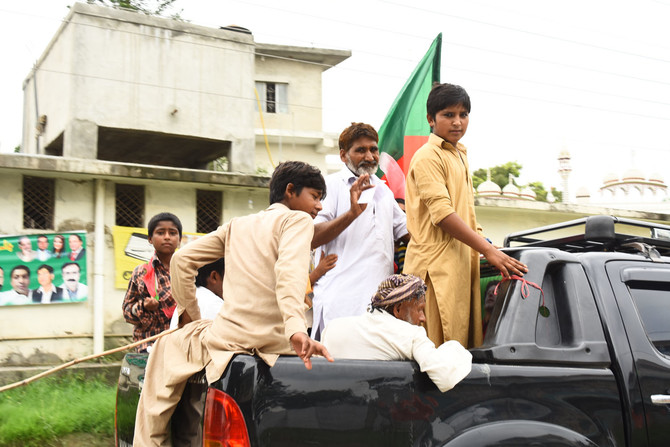ISLAMABAD: July 25, 2018: “I am generally excited at every election, but I think this election was really, really important,” said Sehar Tariq, as she exited the polling station in her voting district.
Country Representative of the United States Institute of Peace and a frequent guest on news shows as a political analyst, Sehar has voted in every election in which she has been eligible to cast a vote.
“There was a lot of talk in the lead-up to these elections about election engineering and manufacturing, which only amplifies how important it is for everyone to go out and vote.”
A sentiment shared by her mother Nadira Tariq, a teacher at the International School of Islamabad.
“I was excited [about this election] in the sense that I think it has been so tough — the whole election. It’s very close and each and every vote truly matters. Everyone should step out and vote.”
Both women were also impressed and inspired by the number of voters who showed up to their longtime polling station, pointing out in particular the heavy volume of women voters, a sight they said they had not seen in previous years.

People line up at registration booths where they were able to have quick and easy sign ups, serial number look ups and more for their district. The various booths were run by supporters of different parties though one could register or look up their information regardless of whom they were voting for. (AN photo by Qamar Anwar)
Sehar opted to vote outside the mainstream choices, choosing an individual standing outside the traditional parties.
“It’s important for democracy to have a wide variety of voices represented. I did not vote for any of the mainstream parties. I went for an independent candidate. I felt the candidate had a good platform to run on and it was someone that I knew to be honest and hardworking.
“This election we have seen a lot of new and young voices come up and they probably will not win a seat this time but it’s important to show that you support them, so they know there is a vote bank that they can continue to build on and grow.”

(Left to right) Nadira Tariq, Sehar Tariq and Tariq Aqil head to to their voting center. The family has utilized their right to vote in every election, with patriarch Tariq consistently voting since 1970. (AN photo by Qamar Anwar)
Tariq Aqil, who teaches at Headstart School, Islamabad, has cast a vote in every election since he was first able to in 1970. The fervor around this election has made it distinctive.
“What is it making (the election) stand out is this great divide between the secular forces and the religious forces. That is the difference, because Imran Khan Niazi is heading the religious faction and others, like the Pakistan People’s Party and the Awami National Party, push for secular democracies.”
But to all three invested citizens there was an accepted result that the voting climate was leaning toward the PTI and the right.
‘‘It will be the PTI. They will form the government but the coalition government along with the MMA — which we call the the Mullah Military Alliance (he laughs) — people may call it something else, with the extreme right-wing religious parties grouped together with Imran Khan.
“Pakistan is going toward right-wing politics, going toward more parties and people who believe more in Shariah and religion, which I believe is a disaster for Pakistan. I’m a student of history and I’ve seen that in any country, in any society where they have mixed religion with politics it’s been bad news, a disaster. This is where Imran Khan is taking this country.”
Sehar, too, predicts a coalition government and imagines that the close numbers with tinkering majorities will lead to the parties and representatives having to find common ground and ways to work together.
“I am hoping the future of Pakistan looks like a peaceful, democratic transition. That is most important, that the election results are not contested and that they are accepted by all parties. But we are probably looking at a coalition government of different political parties in 2018. There will have to be some collaboration between political parties and I think it will be quite interesting to see how different blocks match up. I am excited to see what happens as the evening unfolds.”



























